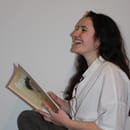It’s entirely possible that after finishing My Grandmother Sends Her Regards and Apologises by Fredrik Backman, you will assure yourself that every book in the world should be narrated by a seven-year-old child.
Elsa, the clever and curious seven-year-old leading readers from reality to fantasy, is the kind of kid whose most prized possession is her Gryffindor scarf and who endures bullying from the kids in her class for using long words. She is also the kid whose best friend is her grandmother.
Elsa’s grandmother breaks into zoos, gets chased down regularly by police, and is Elsa’s key to the Land-of-Almost-Awake and the kingdom of Miamas. This is where Elsa gets to be a knight, and ride cloud animals, and it’s where all the fairytales in the world come from. So when Elsa’s grandmother sends her on a mission, and then dies (dies in a small paragraph that feels massive in its significance), Elsa is devastated. But she has no time to mourn—her grandmother needs her to deliver her letters.
What follows is a fascinating twisting up of reality and the Land-of-Almost-Awake, with parallels perhaps only a seven-year-old could fully understand. As Elsa delivers one letter and finds the next, she learns more and more about who her grandmother was before she was her grandmother, and who the other apartment tenants were before they were the apartment tenants.
Readers discover along with Elsa how everyone she delivers the apologies to fit into the fairytales from Miamas her grandmother shared with her. What is beautiful and remarkable about this blurring of fantasy and truth is that through it, a child is given access to knowledge most children aren’t. When most children in most stories are shut out from the whispers behind closed doors and the longing looks that mean something more, the Land-of-Almost-Awake gives Elsa the ability to understand all of it through fairytales. Elsa learns about terrible, sad things like brothers who don’t speak to each other, and a mother who lost her whole family, and war, and PTSD, and abuse, and what makes someone evil, and what makes someone who isn’t evil do evil things. But to Elsa, these people and these things are princesses, and knights, and queens, and warriors, and battles where you can fight off fear with laughter, and monsters, and even her own mother.
These fairytales are so successful at smudging the edges of reality that for a moment, you will wonder if maybe they are, in fact, the truth after all. And then you will wish, desperately and hopelessly, that every sad and terrible thing in the world could be transformed into a Miamas-worthy fairytale, so that you, too, could view the world with the optimism and curiosity of a seven-year-old child again.
You will count yourself among the lucky ones to have read this book through Elsa’s eyes, eyes that catch things only a child could. Elsa gives you true gems that you will hold on to, like, “Because you can be upset while you’re eating chocolate Santas. But it’s much, much, much more difficult.”
And, by extension, you will count yourself among the lucky ones to have read this book through Backman’s writing, because he layers sadness and laughter until you’re not quite sure exactly how you’re feeling, just that you’re crying and you feel like perhaps there is a little of the kid left in you.
There isn’t a perfect example to sum this up, but if there were, it’s this exchange between Elsa and her (now remarried) dad:
“Is it because of me you don’t want more children?” she asks and hopes he’ll say ‘no’.
“Yes,” he says.
“Because I turned out different?” she whispers.
He doesn’t answer … But then he whispers:
“Because you turned out to be perfect.”
And you will undoubtedly agree that she did.


